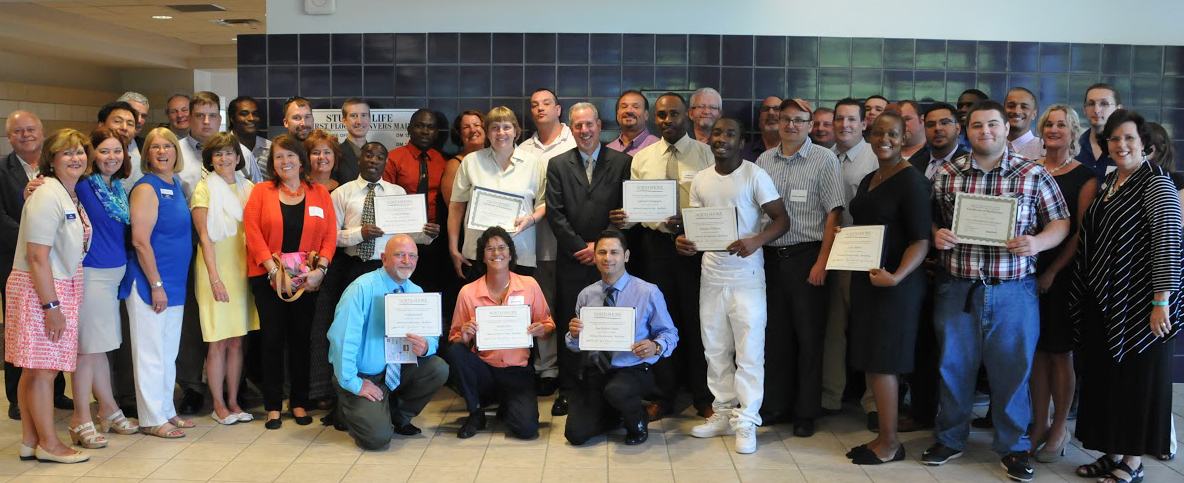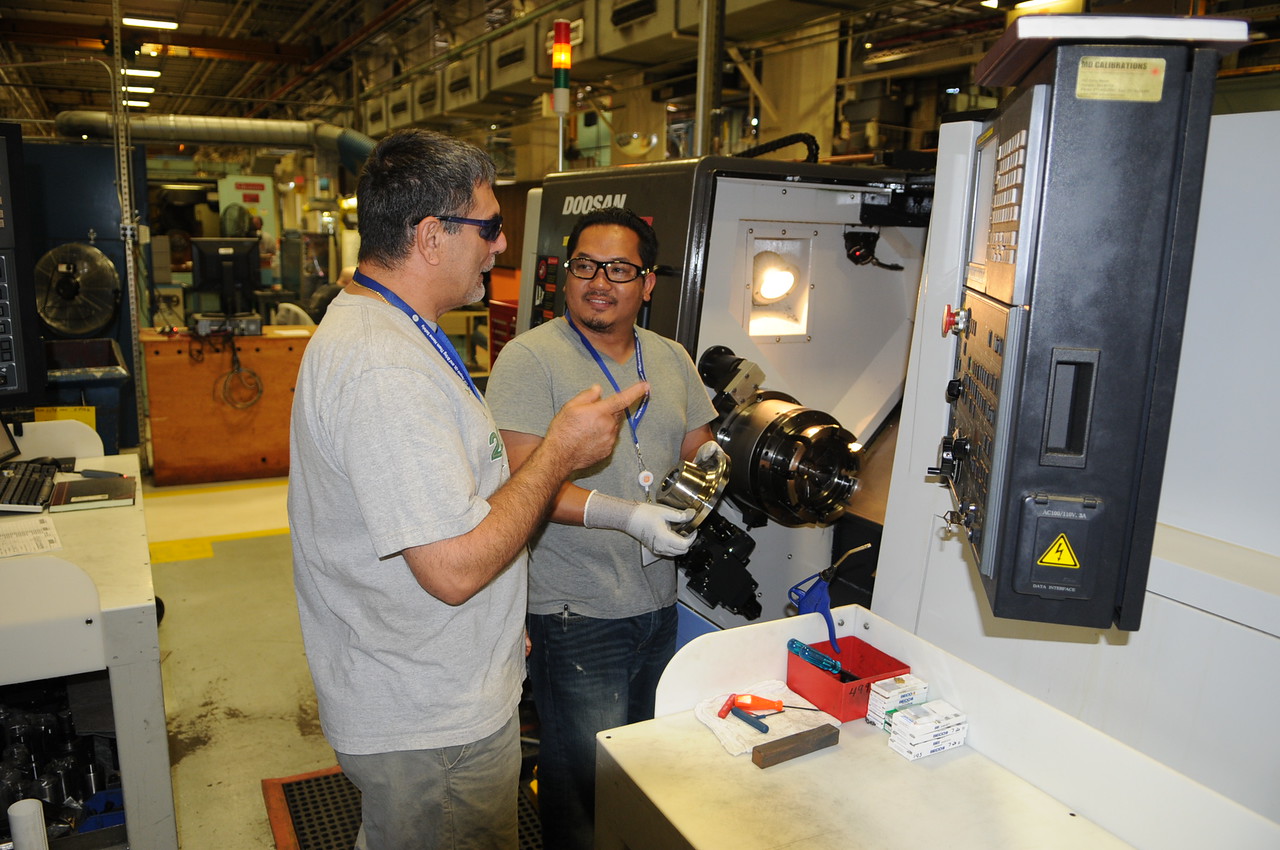Building a Collaborative Model for Workforce Training
North Shore Community College's Machine Training Program creates a mutually beneficial pipeline between students and employers in the Advanced Manufacturing industry.
June 18, 2020
By: Dr. Patricia A. Gentile, President, North Shore Community College
Editor’s Note: On June 18, the Boston Foundation announced that North Shore Community College had been selected as the recipient of the Deval Patrick Prize for Community Colleges. The $50,000 prize is awarded annually to community college programs that demonstrate innovation in workforce development programs. NSCC was recognized for its Machining Training Program, which has successfully built technical and business partnerships to create opportunities for students in advanced manufacturing fields. (Read the press release here.)
With coronavirus keeping us from having our annual celebration in honor of the prize winner, we invited Dr. Patricia Gentile, the President of North Shore Community College, to share her thoughts on the City of Ideas blog.
The Machining Training Program supports the state’s economic growth strategy by ensuring individuals have access to skills development, and the opportunity to continuously improve their skills and knowledge to pursue their own professional and personal goals while meeting the varied needs of employers. The program directly responds to the need for skilled workers in the high priority Advanced Manufacturing industry and has been successful in providing opportunities for area residents to begin their career pathway in the sector. Program goals include program completion, receipt of an industry-recognized credential/certification, and a successful student placement employment rate.
NSCC has worked collaboratively with many employer, workforce, and education partners to recruit, train, and place adults in high-paying, high-demand manufacturing jobs in the region. The program is an excellent example of a true public, private partnership with a high success rate that has grown and evolved over many years. It has proven an excellent investment, which illustrates the pivotal role that community colleges play in upscaling and retraining vital workforce sectors. The success of this program demonstrates how in the midst of this pandemic, economic downturn and significant rise of unemployment, community colleges are uniquely positioned to contribute to the recovery of the Commonwealth.
Ultimately what makes this program and others like it so very special is the difference it makes in people’s lives. I love attending the graduation ceremonies and hearing the stories of the students and their newfound pride and confidence in their abilities. Let me leave you with one example. Peter McCarty is a graduate of the 2019 Machining Training Program who has been accepted into the GE Apprentice Program. He wrote, “I am a 53 old man, who once again found himself unemployed after yet another large company buyout (one of many I’ve experienced over the years) to have the opportunity to train for a field that’s not only lucrative, but almost guarantees me I won’t have to spend another sleepless night wondering where my next pay check will come from. I was with a group of wonderful men and women of all ages and ethnicities who all seemed to want what I wanted, a decent job, with decent wages that will put food on our tables, pay our bills and provide a promising future. Some were young kids just starting out in life, others were established professionals, some even engineers, looking for a change. Thank you all that helped make this happen. I’ll be forever grateful to you all.”
Doesn’t that say it all? Thank you to The Boston Foundation for this meaningful recognition of the work that NSCC and its many partners have done and will continue to do to educate and train the workforce and help employers meet their employment demands.
Editor’s Note: On June 18, the Boston Foundation announced that North Shore Community College had been selected as the recipient of the Deval Patrick Prize for Community Colleges. The $50,000 prize is awarded annually to community college programs that demonstrate innovation in workforce development programs. NSCC was recognized for its Machining Training Program, which has successfully built technical and business partnerships to create opportunities for students in advanced manufacturing fields. (Read the press release here.)
With coronavirus keeping us from having our annual celebration in honor of the prize winner, we invited Dr. Patricia Gentile, the President of North Shore Community College, to share her thoughts on the City of Ideas blog.
On behalf of the many education, workforce and employer partners who have contributed to the success of North Shore Community College’s Machining Training Program since its inception in 2013, I am proud to accept and am grateful for the Boston Foundation’s 2020 Deval Patrick Prize for Community Colleges.
The Machining Training Program supports the state’s economic growth strategy by ensuring individuals have access to skills development, and the opportunity to continuously improve their skills and knowledge to pursue their own professional and personal goals while meeting the varied needs of employers. The program directly responds to the need for skilled workers in the high priority Advanced Manufacturing industry and has been successful in providing opportunities for area residents to begin their career pathway in the sector. Program goals include program completion, receipt of an industry-recognized credential/certification, and a successful student placement employment rate.
NSCC has worked collaboratively with many employer, workforce, and education partners to recruit, train, and place adults in high-paying, high-demand manufacturing jobs in the region. The program is an excellent example of a true public, private partnership with a high success rate that has grown and evolved over many years. It has proven an excellent investment, which illustrates the pivotal role that community colleges play in upscaling and retraining vital workforce sectors. The success of this program demonstrates how in the midst of this pandemic, economic downturn and significant rise of unemployment, community colleges are uniquely positioned to contribute to the recovery of the Commonwealth.
Ultimately what makes this program and others like it so very special is the difference it makes in people’s lives. I love attending the graduation ceremonies and hearing the stories of the students and their newfound pride and confidence in their abilities. Let me leave you with one example. Peter McCarty is a graduate of the 2019 Machining Training Program who has been accepted into the GE Apprentice Program. He wrote, “I am a 53 old man, who once again found himself unemployed after yet another large company buyout (one of many I’ve experienced over the years) to have the opportunity to train for a field that’s not only lucrative, but almost guarantees me I won’t have to spend another sleepless night wondering where my next pay check will come from. I was with a group of wonderful men and women of all ages and ethnicities who all seemed to want what I wanted, a decent job, with decent wages that will put food on our tables, pay our bills and provide a promising future. Some were young kids just starting out in life, others were established professionals, some even engineers, looking for a change. Thank you all that helped make this happen. I’ll be forever grateful to you all.”
Doesn’t that say it all? Thank you to The Boston Foundation for this meaningful recognition of the work that NSCC and its many partners have done and will continue to do to educate and train the workforce and help employers meet their employment demands.


